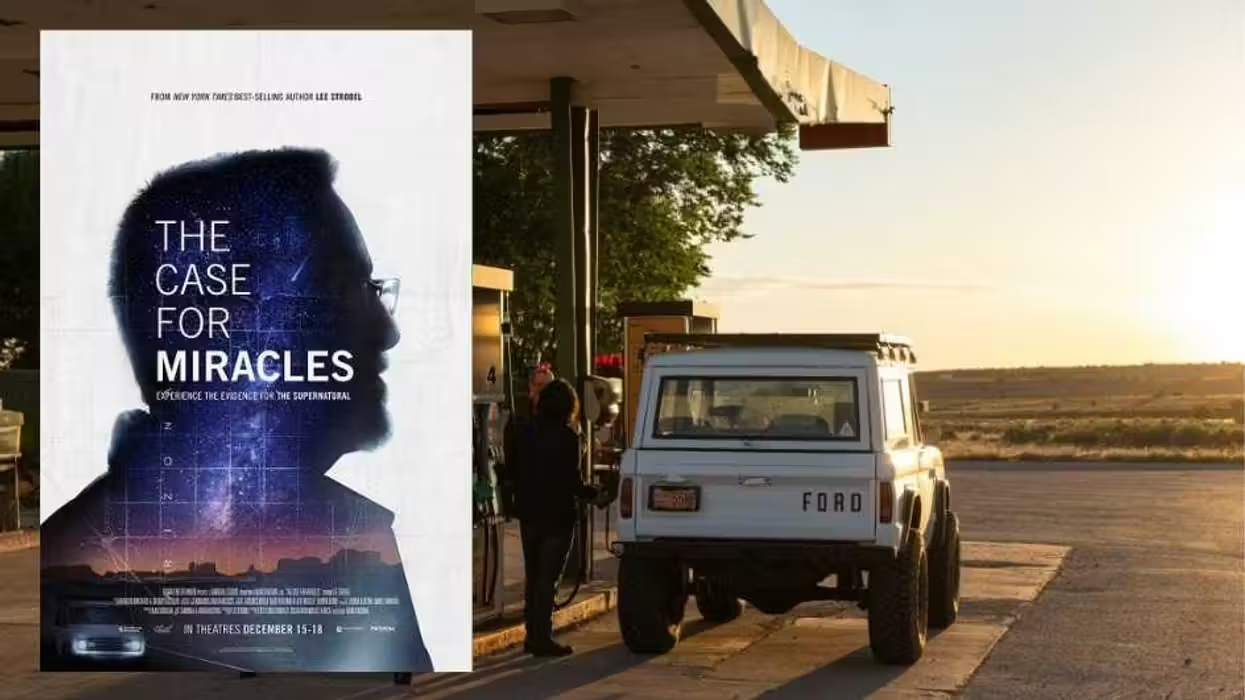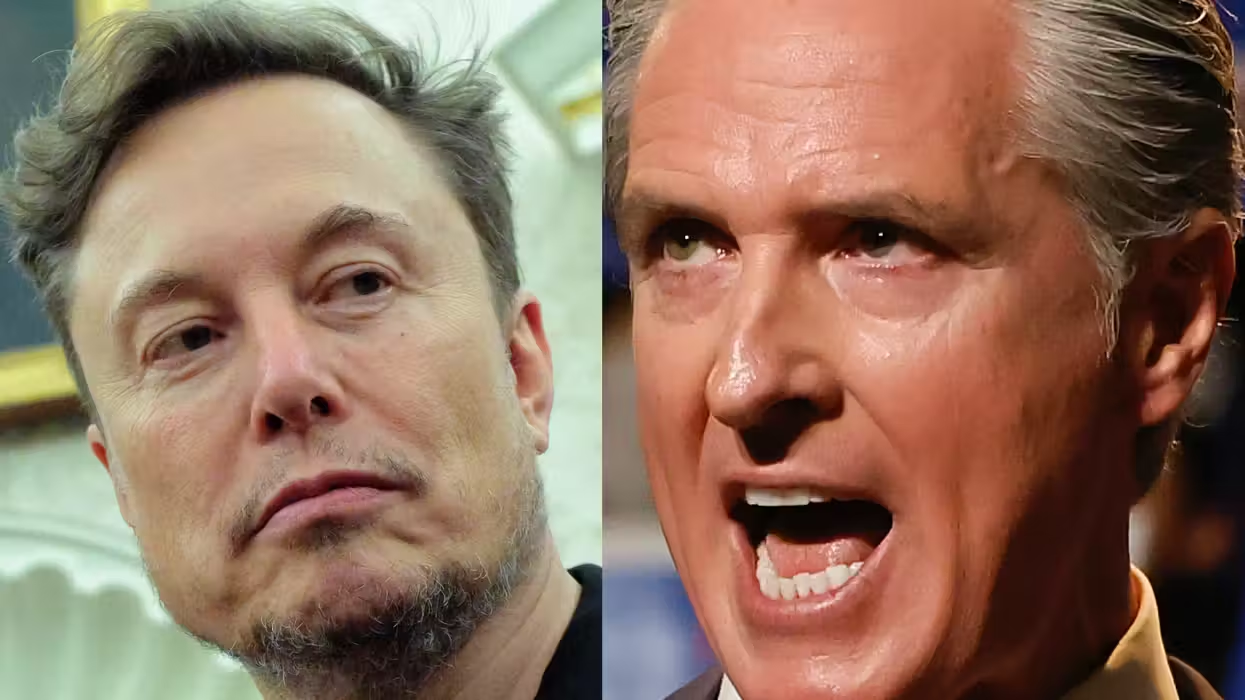
© 2025 Blaze Media LLC. All rights reserved.
The Other Schindler: Do You Know the Amazing Story of the Musician Who Rescued 1,000 Jews from Holocaust?
February 14, 2013
“Heroic figure.”
 Bronislaw Huberman (Photo courtesy: Felicja Blumental Music Center Library via Orchestra of Exiles)
Bronislaw Huberman (Photo courtesy: Felicja Blumental Music Center Library via Orchestra of Exiles)
Thanks to Steven Spielberg, we’ve all heard of Oskar Schindler. Now, the inspiring story of another man who faced huge odds and grave personal risk to save hundreds of Jews from the Nazis is coming to light.
In the early 1930s, Adolf Hitler began forcing Jewish musicians out of orchestras across Germany, a policy that would spread to other countries the German Third Reich occupied. Previously engrossed in his own wildly successful career, Polish Jewish violinist Bronislaw Huberman embarked on a four-year journey to rescue those Jews from the Nazis’ grip and with their help form the orchestra that would become the Israel Philharmonic. This is the same orchestra that today is met in American and European cities by pro-Palestinian protesters who try to shout down their beautiful music. A new film, Orchestra of Exiles, documents this one man’s struggle in the face of Nazi aggression that resulted in the saving of 1,000 Jews from the Holocaust.
TheBlaze had the opportunity to watch the documentary and speak with its director, Josh Aronson, who is not only an Academy Award-nominated filmmaker, but is also an amateur chamber concert pianist. He calls Huberman a “heroic figure” whose story drew him and his film crew to five countries to try to discover how he accomplished an almost impossible feat.
Aronson says, “This was a man who stood up against intolerance at a time when world level musicians were pushing on with their own careers and looking the other way. He was one of the few artists at that level who actually walked away from a very lucrative career in protest of racial policies in Germany.”
Huberman’s Promising Career and the Rise of Nazism
Bronislaw Huberman’s father discovered that his son was a prodigy at an early age. When he was a young child, his impoverished family in Poland somehow cobbled together their meager funds - including selling their furniture - to send him to study with a violin master in Berlin.
Soon, Huberman’s career would take off, leading him to perform for royalty and once even for famed composer Johannes Brahms who was impressed by the boy’s abilities.
When the Nazis took over Germany, they began dismissing virtuoso Jewish musicians from their jobs, as they did to Jews in other professions. First the Jews were fired and kicked out of school, then they were rounded into ghettos, and eventually they were transported to concentrations camps where Hitler’s extermination plan was implemented.
“He had a sense of what was coming very early as some people did. He had seen pogroms in Poland so he knew how dangerous this pendulum swing of anti-Semitism was; he knew how violent it could get because he felt it,” Aronson tells TheBlaze.
Because of his well-heeled connections, the Jewish Huberman was almost guaranteed to escape the Nazis. But his own well-being wasn’t enough for him. According to the film, Huberman once said:
I had to descend into the furthest depths of my soul to find the hidden link between my impulse towards art and my impulse towards politics. Then I made a huge discovery. The true artist does not create art as an end in itself. He creates art for human beings. Humanity is the goal.
Huberman visited Palestine under the British mandate in 1929. While there, he was inspired with the idea of establishing a symphony orchestra made up of Jews who had moved there. Once he saw his fellow musicians being persecuted in Europe, he realized he could merge his political goal of saving Jews with his desire to bring classical music to the Holy Land.
 In the film, actor Thomas Kornmann playing Bronislaw Huberman uses a production board to help visualize the Palestine Symphony in its construction (Photo courtesy: Orchestra of Exiles)
In the film, actor Thomas Kornmann playing Bronislaw Huberman uses a production board to help visualize the Palestine Symphony in its construction (Photo courtesy: Orchestra of Exiles)
And so his odyssey of raising the substantial funds and finding the right talent began. With the help of the survivors’ children, Orchestra of Exiles describes how Huberman traveled for two years from city to city where the Nazi scourge would spread – including Budapest, Prague, Berlin, Warsaw - to audition the best 70 Jewish musicians on string, woodwind and brass.
Building the Orchestra and Fighting the Nazis
The film describes how Huberman had to “empty his emotions” during auditions and choose his players for the Palestine Symphony Orchestra objectively based on skill. Rejecting musicians meant they would face almost certain death, which tragically rendered him a judge.
His defiance of the Nazis didn’t stop there. He stunned his audiences by canceling his concerts to protest the anti-Jewish laws in Germany. He moved to Vienna and gave a concert there in honor of victims of anti-Semitism. Huberman was furious when his longtime piano accompanist was forbidden to play with him, a Jewish violinist, a development that only further steeled his nerves for the daunting task he’d taken on.
Getting Jews out of Eastern Europe was an almost impossible goal. Virtually every country in Europe, Latin America and North America – including the U.S. – rejected most applications for visas. In Palestine, the British authorities had instituted strict quotas limiting the entrance of Jews.
Aronson says, “He wrote that this is becoming a mission of rescue in addition to becoming a mission to start an orchestra.”
Huberman was fundraiser-in-chief, delivered speeches, wrote articles, and gradually transformed himself from musician to statesman. His larger-than-life story was enhanced by his surviving a plane crash which caused severe damage to his hands. Though doctors said he’d never play violin again, Huberman eventually regained the strength and skill to play.
Not only did Huberman succeed in getting his 70 musicians out of Europe, he also secured travel permits via his powerful government connections for their families and more distant relatives who pleaded for his help.
Huberman recruited famed conductor Arturo Toscanini, a virulent opponent of the Fascism that had taken over his native Italy. While he refused to conduct at the German Bayreuth Festival in 1933 and personally sent a cable to Hitler protesting his persecution policies, Toscanini agreed to conduct the first concerts of the newly formed Palestine Symphony Orchestra.
 Maestro Arturo Toscanini and Bronislaw Huberman after first Palestine Symphony concert in 1936 (Photo courtesy Felicja Blumental Music Center Library via Orchestra of Exiles)
Maestro Arturo Toscanini and Bronislaw Huberman after first Palestine Symphony concert in 1936 (Photo courtesy Felicja Blumental Music Center Library via Orchestra of Exiles)
We won’t give away the end of the film, that is, who is saved, who decides to return to Nazi-occupied Europe, which famous American violinist now plays Huberman’s Stradivarius, and what happened once Israel was officially declared an independent Jewish state (a tear-inducing moment). Suffice to say, in 1948 the orchestra’s name was changed to the Israel Philharmonic Orchestra (IPO).
Threats the Orchestra Faces Today
Huberman’s story casts new light on aggressive pro-Palestinian demonstrations staged regularly at IPO concerts by groups including the Boycott, Divestment and Sanctions Movement and the Palestine Solidarity Campaign, most famously in September 2011 when they shouted repeatedly during a London concert, forcing the BBC to interrupt its broadcast.
Today, several of the musicians of the IPO are the children and grandchildren of the original Holocaust refugees who established the fledgling orchestra under Huberman, a fact the protesters don’t mention in their statement that the IPO is supposedly complicit “in whitewashing Israel’s persistent violations of international law and human rights.”
When the IPO performed in October at Carnegie Hall in New York, film director Aronson accosted those protesting outside the concert venue: “I went up to talk to the picketers to ask what their logic was. In my view, to say that this has anything to do with the politics of Israel is so misguided, it’s just absurd.”
It’s not only Nazi aggression and radical protesters this resilient orchestra has faced. In 1991, as Iraqi SCUDs were falling on Israel, IPO musicians did not stop playing in Tel Aviv when air raid sirens wailed and audience members put on their gas masks.
 Audience members wear gas masks during Israel Philharmonic Orchestra concert in 1991 (Screen shot from YouTube)
Audience members wear gas masks during Israel Philharmonic Orchestra concert in 1991 (Screen shot from YouTube)
During the Gulf War, Maestro Zubin Mehta conducted a special concert from a sealed room [aimed at keeping out nerve gas then feared to be in Saddam Hussein’s arsenal]. He told the television audience that his musicians were going to play their hearts out for the public of Israel who he said was facing Saddam’s SCUDs in an exemplary manner. In 2006, the orchestra was in the middle of a performance in Haifa when Hezbollah rockets slammed into the city. Nobody left the concert hall.
Even while anti-Israel demonstrators defame the orchestra, IPO Muscial Director Zubin Mehta has publicly committed himself to recruiting a Palestinian musician to the IPO and to teaching music to Israeli Arab children.
Aronson says though he’s previously made other documentary films, this experience was different.
“What struck me was, here was a Jew who saved 1,000 Jews who was completely forgotten…I thought this was a story that needed to be told, a piece of history that needed to be resurrected,” he says.
“What I get from the screenings, people come to me as no other film I’ve ever made thanking me for making this film for bringing his story to light.”
Thanks to Aronson and the survivors, Huberman’s legacy is now being recognized. The film which includes interviews with renowned musicians including violinists Joshua Bell and Itzhak Perlman is currently being shown at film festivals and on college campuses around the country. PBS decided to broadcast it nationwide on April 14.
More information on the inspiring film, it’s amazing soundtrack which includes recordings of Huberman himself playing, and how to order the DVD can be found here.
Here is the trailer from the film Orchestra of Exiles:
Want to leave a tip?
We answer to you. Help keep our content free of advertisers and big tech censorship by leaving a tip today.
Want to join the conversation?
Already a subscriber?
more stories
Sign up for the Blaze newsletter
By signing up, you agree to our Privacy Policy and Terms of Use, and agree to receive content that may sometimes include advertisements. You may opt out at any time.
Related Content
© 2025 Blaze Media LLC. All rights reserved.
Get the stories that matter most delivered directly to your inbox.
By signing up, you agree to our Privacy Policy and Terms of Use, and agree to receive content that may sometimes include advertisements. You may opt out at any time.






